Do you want to start a WordPress blog the right way?
We know that starting a blog can be a terrifying thought, especially when you are not geeky. Guess what – you are not alone.
Having helped over 2 million+ users create a blog, we have decided to create a step-by-step guide on how to create a blog for beginners without any technical knowledge.
In this in-depth guide, we’ll walk you through the entire process. We’ll also talk about working on your blog and growing it steadily.
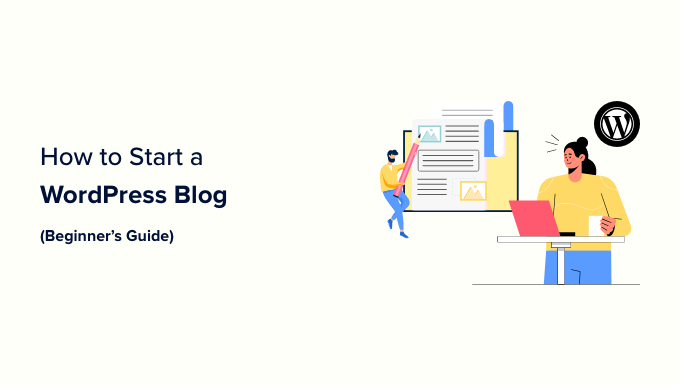
The process is easy to follow whether you are 20 years old or 60 years old. However, if you need help, our expert team will help you set up your blog for free. → Click Here to Get Your Free WordPress Blog Setup! ←
What Do You Need to Start a WordPress Blog?
There are three things you need to create a WordPress blog:
- A domain name idea (this will be the name of your blog, i.e., wpbeginner.com)
- A web hosting account (this is where your website lives on the internet)
- Your undivided attention for 30 minutes.
Yes, you read it right. You can start a blog from scratch in less than 30 minutes, and we will walk you through the whole process step by step.
In this tutorial, we will cover:
Ready? Let’s get started.
Video Tutorial
If you don’t like the video or need more instructions, then continue reading.
Step 1. Pick Your Blog Name and Platform
The biggest mistake beginners make when building a blog is choosing the wrong blogging platform. Thankfully, you’re here and won’t be making that mistake.
For 95% of users, it makes more sense to use WordPress.org, also known as self-hosted WordPress.
That’s because WordPress is open-source, which means it is 100% free to use. You can install plugins, customize your blog design, and most importantly, make money from your blog without any restrictions (see the difference between WordPress.com vs. WordPress.org).
WordPress is also the number one website platform used by all successful blogs, including our own. To put it in perspective, 43% of all websites on the internet use WordPress!
Now you might be wondering why WordPress is free. What’s the catch?
There’s no catch. It’s free because you have to do the setup and host it yourself.
In other words, you will need a domain name and web hosting.
A domain name is what people type to get to your website. It’s your blog’s address on the internet. Think google.com or wpbeginner.com
Web hosting is where your website files live. It’s your website’s house on the internet. Every blog needs web hosting.
A new domain name typically costs around $14.99 / year, and web hosting plans normally cost $7.99 / month.
That’s a lot of money for beginners who are just starting out.
Thankfully, Bluehost, an official WordPress-recommended hosting provider, has agreed to offer our users a free domain name and a generous discount on web hosting.
You can also use other popular WordPress hosting companies like SiteGround or Hostinger, and still be able to follow our blog setup tutorial.
We recommend Bluehost for beginners because it is one of the oldest web hosting companies on the internet. They are also the largest brand name when it comes to WordPress hosting because they host millions of websites, including many of our own.
On top of all this, Bluehost has been working with WordPress since 2005, and they are committed to giving back.
That’s why they have promised us that if you cannot get your blog online within 30 minutes by following this tutorial, then our expert team will complete the process for you without any cost. They will compensate us, so you don’t have to. Contact us for free blog setup help.
NOTE: At WPBeginner, we believe in transparency. If you sign up with Bluehost using our referral link, we will earn a small commission at no extra cost to you (in fact, you will save money and get a free domain). We would get this commission for recommending just about any WordPress hosting company, but we only recommend products that we personally use and believe will add value to our readers.
Let’s go ahead and purchase your domain + hosting.
Open up Bluehost in a new window and follow along.
The first thing you need to do is click on the green Get Started Now button to get started.

On the next screen, select the plan that you need (Basic and Choice Plus are the most popular).
After that, you will be asked to enter the domain name for your website.
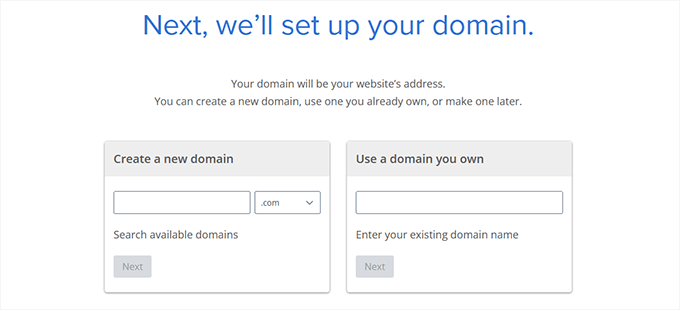
Lastly, you will need to add your account information and finalize the package info to complete the process. We recommend going with the 12-month plan because that’s the best value.
On this screen, you will see optional extras that you can purchase. It’s entirely up to you whether or not you purchase these, but we generally don’t recommend purchasing them right away.
You can always add them later on if you decide that you need them.
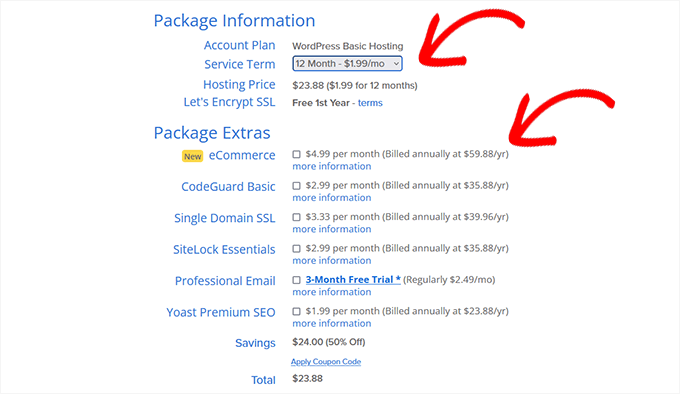
Once completed, you will receive an email with details on how to log in to your web hosting control panel (cPanel).
This is where you manage everything from support emails to FTP access among other things. But most importantly, this is where you install WordPress.
Step 2. Install WordPress Blogging Software
When you sign up with Bluehost using our link, they will automatically install WordPress for you, so you can start building your blog right away.
Simply log in to your Bluehost account, and then click the Login to WordPress button to get started.
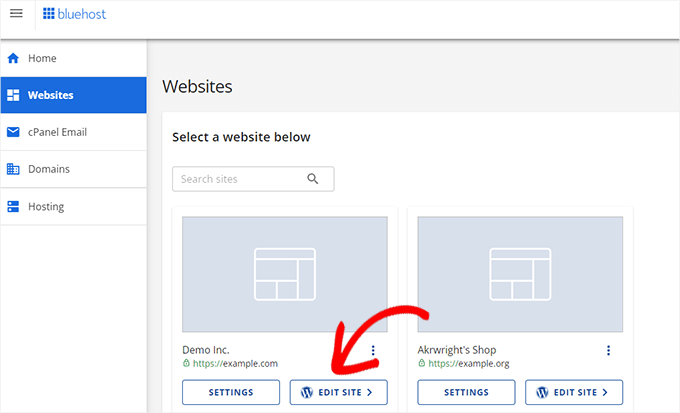
You can also log in to WordPress by going to yoursite.com/wp-admin/ directly from your browser.
If you are using a different WordPress blog hosting service like SiteGround, Hostinger, WP Engine, etc, then you can see our comprehensive guide on how to install WordPress for step-by-step instructions for those providers.
Most of the above blog hosting companies are now also automatically installing WordPress to help non-techy users kickstart their blogging journey.
Once WordPress is set up, you’re ready to create your blog pages, customize your blog’s design, and start blogging.
Step 3. Selecting Your WordPress Theme
The visual appearance of your WordPress blog is controlled by blog themes. When you first visit your blog, it will look something like this:
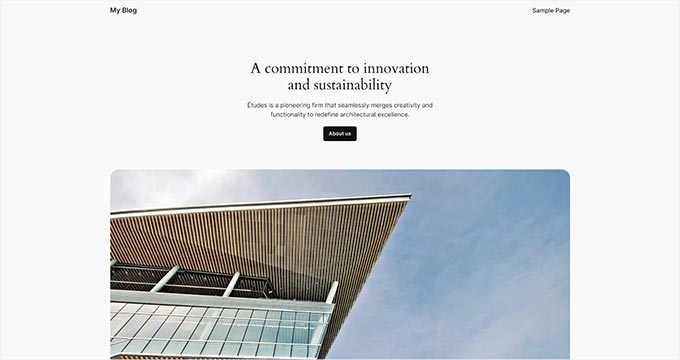
This is not very appealing to most people.
Customizing the look and feel of your blog is by far one of the most exciting and rewarding parts of the journey of creating your WordPress blog.
There are thousands of pre-made WordPress themes that you can install on your site. Some of them are free themes, while others are paid premium themes.
You can change your theme by going to your WordPress dashboard and clicking on Appearance » Themes.
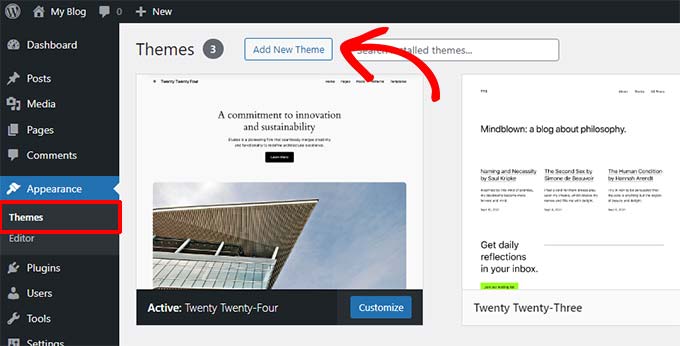
Go ahead and click on the Add New Theme button.
On the next screen, you will able to search from 11,000+ free WordPress themes that are available in the official WordPress.org themes directory. You can sort by Popular, Latest, Block Themes, as well as other feature filters (i.e. industry, layout, etc.).
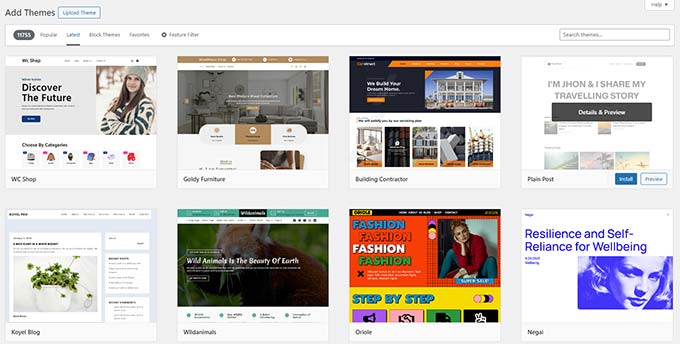
You can take your mouse over to a new theme, and you will see a Preview button.
Clicking on it will open the theme preview where you can see how the design would look on your website.
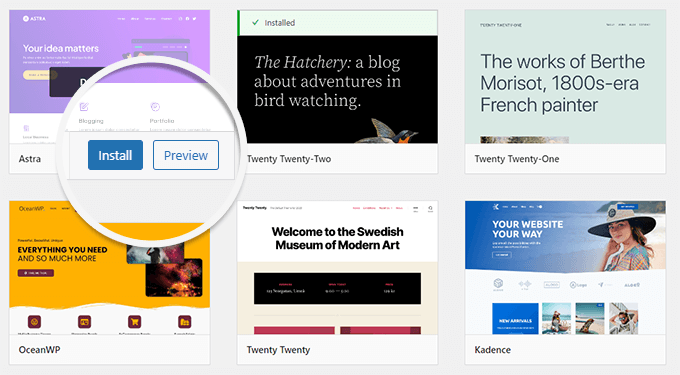
The preview of your theme may not look exactly as shown in the screenshot, which is normal as you will get to customize and set it up later.
What you need to look for is design, colors, typography, and other elements.
The best tip to select the perfect WordPress theme is to strive for simplicity in design. It helps you keep things clean and clear while offering a good experience to your users.
If you need help selecting a theme, then please refer to our guide on things you should consider when selecting a perfect WordPress theme.
When you have found the theme that you like, simply bring your mouse on it, and it will show the Install button.
Click on it and wait for the theme to be installed. After that, the install button will be replaced with an Activate button. You need to click on it to Activate the theme.
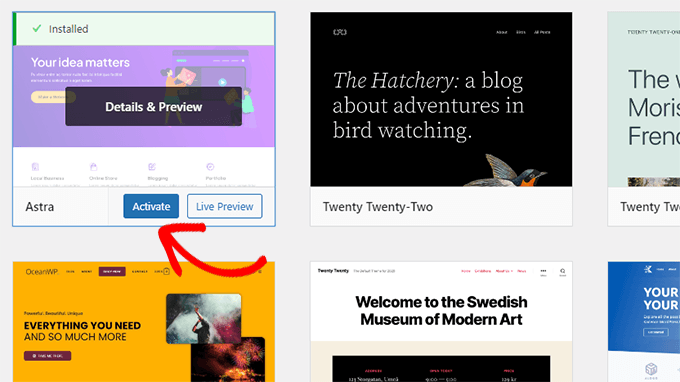
Once you have installed your theme, you can customize it by clicking on the Customize link under the Appearance menu.
Depending on the theme you choose, there will be built-in widgets and customization options that let you tweak your blog design.
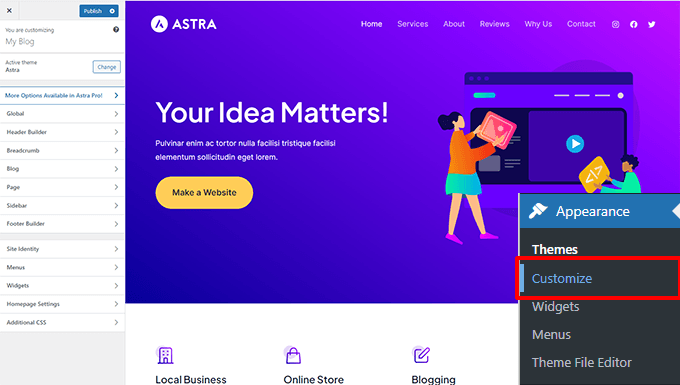
Note: If you cannot see the customize link under the Appearance menu, then this means you are using a block theme. Block themes use the WordPress block editor to edit and customize a WordPress theme.
You can edit a block theme by visiting the Appearance » Editor page.
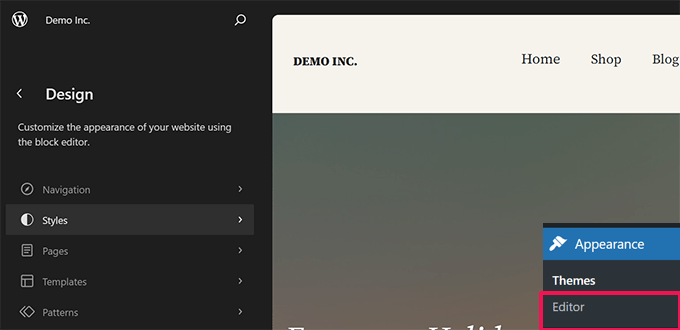
You can get even more design control with a WordPress page builder like SeedProd or Divi, which let you create a custom header, footer, sidebar, and more without writing any HTML code.
These plugins give you more design control than what you get with Wix or Squarespace while giving you the full freedom of the powerful WordPress content management system.
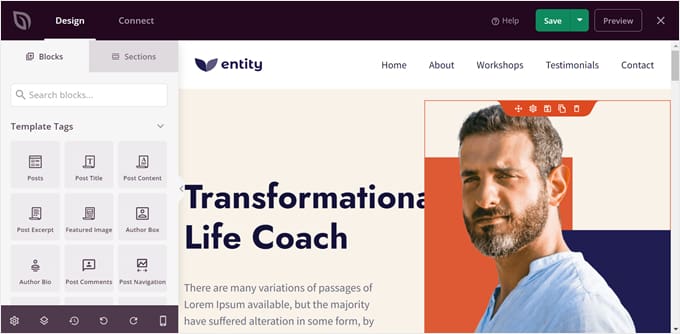
Once you have selected your WordPress theme, you are now ready to create your first blog post.
Alternative: You can get your dream blog designed by expert WordPress developers at an affordable price with WPBeginner Pro Services. Custom web design includes bespoke homepage design, professional logo, 5 templated subpages, blog setup, and more.
Step 4. Creating Your First Blog Post
To write your first blog post, click the Posts » Add New menu in your WordPress dashboard.
You will see an editor area where you can write your first blog post.
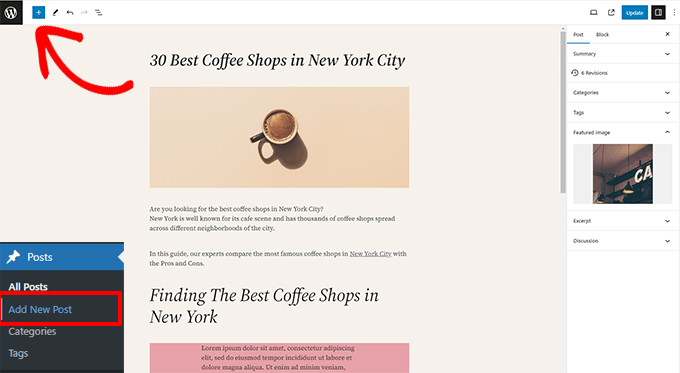
WordPress uses a block-based editor that allows you to create beautiful content layouts for your blog posts.
To familiarize yourself with the editor, see our WordPress block editor tutorial.
Once you’re done writing, go ahead and click on the Publish button on the top-right corner of the screen to make your blog post publicly available.
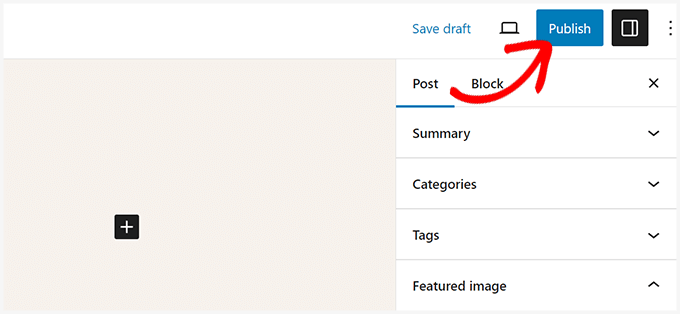
On the posts screen, you will notice several other sections, such as Categories and Tags. You can use these to organize your blog posts into sections.
We have a great write-up on the difference between categories vs tags, which we highly recommend that you read.
To utilize all the features on the posts screen, you should read our article on how to add a new post in WordPress (video included).
It covers how to embed videos, add blog images, headings, table of contents, sub-headers, bullet lists, call-to-action buttons, social media posts, and all other shortcuts you need.
Often, beginners are confused between Posts and Pages menus in the WordPress dashboard. That’s why we have also written a complete guide on the difference between posts vs pages in WordPress.
If you need help brainstorming new blog post ideas to write about, then here are some helpful resources:
- Free blog post idea generator tool by WPBeginner
- 103 blog post ideas that your readers will love
- 73 types of blog topics that are proven to work
- How to write a great blog post (structure + examples)
Many pro bloggers choose their specific topics strategically by doing keyword research. This helps their content rank higher in Google search and get more traffic.
We have a step-by-step guide on how to do keyword research for beginners using the exact same method that we use on WPBeginner.
Step 5. Plugins & Customizations
Once you have written your first blog post, you probably want to get started with adding other usual elements to your website, such as a contact page, galleries, sliders, email lists, forums, etc.
To add all these additional features, you need to use plugins.
Plugins are like apps for your WordPress website. They allow you to add new features to your site (without writing any code).
There are over 59,000+ WordPress plugins available in the free WordPress plugin directory alone. This means no matter what you want to accomplish, there is a plugin for it.
We have a step-by-step guide on how to install a WordPress plugin.
That being said, let’s take a look at how to use plugins to add some essential features to your WordPress blog.
How to Create a Contact Form in WordPress
Every website needs a contact form. It allows your users to email you directly. Since WordPress doesn’t come with a built-in contact form, you will need a WordPress form builder plugin to add a contact form to your site.
We recommend using the WPForms Lite plugin. It is a free version of the popular WPForms plugin, which is #1 in our list of best contact form plugins for WordPress.
Over 6 million websites use WPForms!
You can install the plugin by going to Plugins » Add New page and typing WPForms in the search box. Next, you need to click “Install” and then “Activate”. Upon activation, you need to head over to the WPForms » Add New page to create your first form.
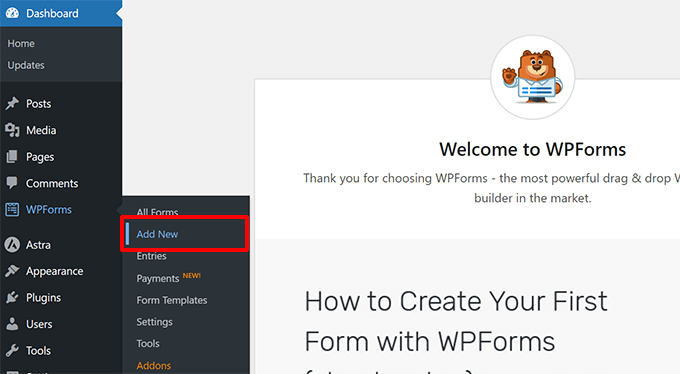
This will open the WPForms builder interface.
First, you need to enter a name for your contact form and then click on ‘Simple Contact Form’ template.
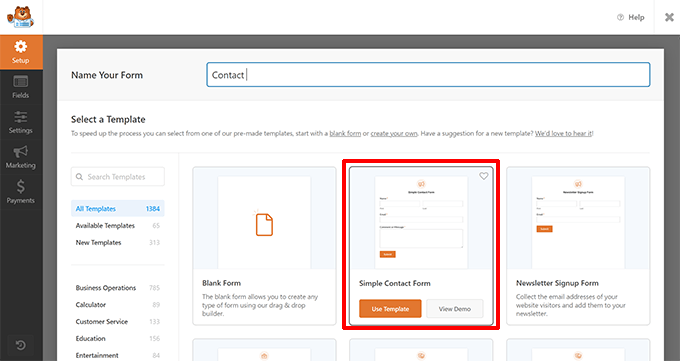
WPForms will now create a simple contact form for you with all the required fields.
You can click on any field to change it or add a new field from the left column.
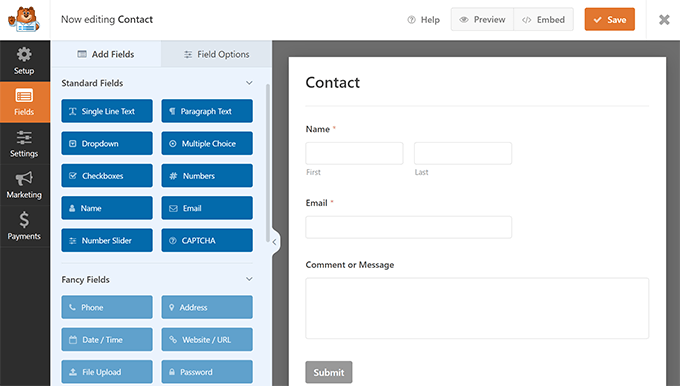
Once you are done editing the form, click on the save button at the top right corner and then exit the form builder.
You can now create a new page in WordPress by going to Pages » Add New Page and naming it ‘Contact.’
On the edit screen, you need to add the WPForms block into the editor.
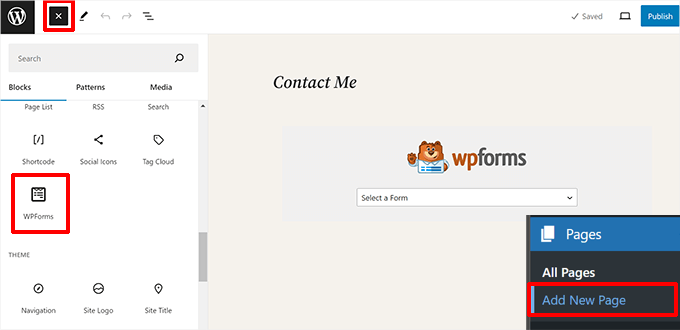
After that, select the form you created earlier from the drop-down menu.
WPForms will load a live preview of the form in the editor.
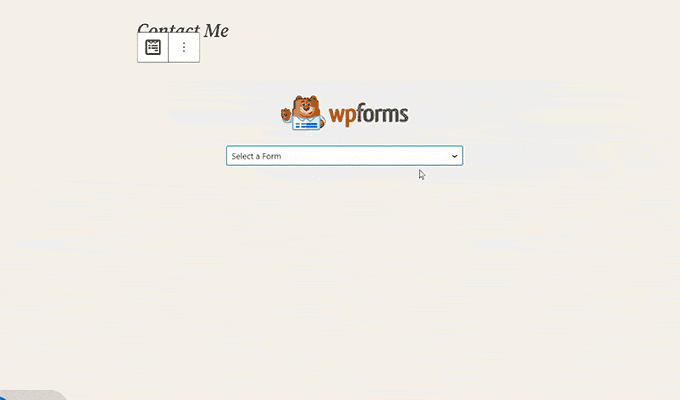
You can now save and publish the page and visit it in your browser to see your contact form in action.
It’s a best practice to test your form to make sure you’re receiving the notifications. If you don’t get the notification, then you should see our guide on how to fix WordPress not sending emails.
If you need more detailed instructions, then see our step-by-step guide on how to create a contact form in WordPress.
As a blogger, the best part about WPForms is that it grows with you. Aside from simple contact forms, you can also use it to create reader surveys, polls, guest post submission forms, and more.
How to Setup Google Analytics Tracking
Google Analytics helps you see how many people are visiting your blog, where they are coming from, and what they are doing on your website.
It is best to install Google Analytics when starting your blog so you can see how much it has grown over time.
First, you need to visit the Google Analytics website and sign in using your Gmail account.
Once you are logged in, you can go ahead and sign up for a free Google Analytics account.
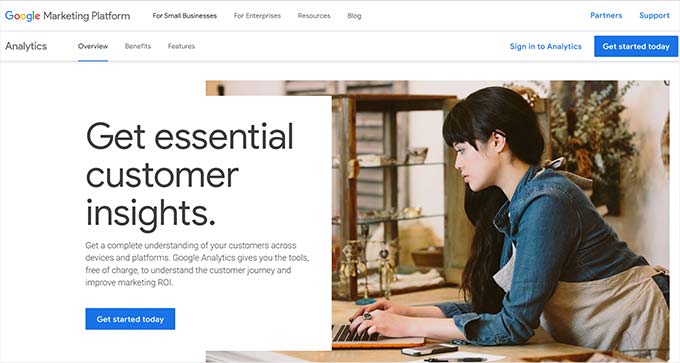
You will be asked to provide your information and website URL. After that, you will be presented with your Google Analytics tracking code.
You can stop here because we will be using a plugin to automatically fetch and add this code to your blog (along with setting up proper WordPress tracking).
Switch to your WordPress admin area to install and activate the MonsterInsights plugin. It is the free version of the best Google Analytics plugin for WordPress, and it is the easiest way to add Google Analytics on your site (trusted by over 3 million websites).
Upon activation, you need to visit Insights » Settings page to configure the plugin settings.
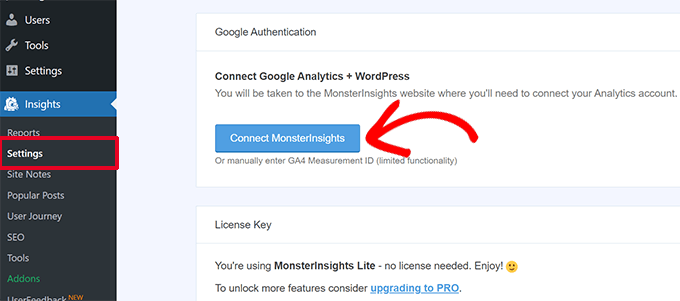
On the settings page, click on the ‘Connect MonsterInsights’ button to connect Google Analytics to your WordPress site.
Follow the on-screen instructions to complete the setup. Once done, you will be able to see your website analytics report straight from your WordPress dashboard under the MonsterInsights tab.
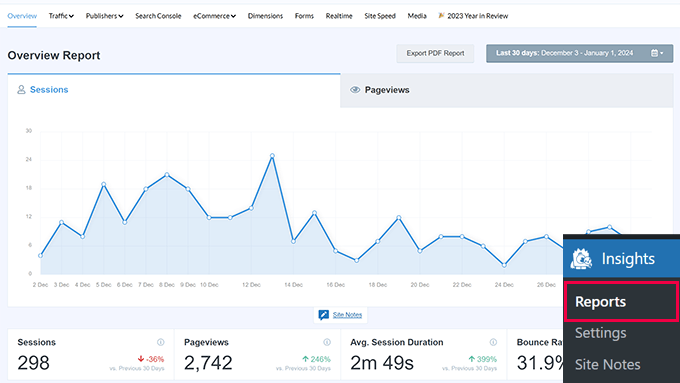
For detailed instructions, see our article on how to install Google Analytics in WordPress.
How to Optimize Your WordPress Blog for SEO
Most beginners don’t optimize for SEO when creating a blog. SEO or search engine optimization helps users find your blog in search engines.
If you want more traffic, then it’s crucial that you optimize your blog for SEO right from the beginning.
To get started, you first need to install and activate the All in One SEO plugin. It is the complete WordPress SEO plugin that will help you optimize your blog.
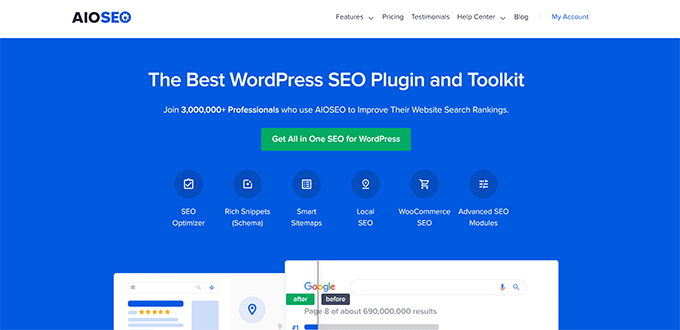
The plugin comes with a quick configuration wizard to help you walk through the setup.
It will help you configure a WordPress sitemap, write proper keywords and meta descriptions, add schema markup, and more.
We also recommend you follow our complete step-by-step WordPress SEO guide to set up your blog’s SEO.
Now there are other SEO plugins like Yoast SEO, RankMath, etc, but we recommend using AIOSEO because it offers the most beginner-friendly interface for new bloggers. We use it on all our blogs, including WPBeginner.
The free version of AIOSEO is pretty good and is used by over 3 million websites.
Aside from a WordPress SEO plugin, you can further optimize your blog content by using a keyword research tool. These SEO tools help you come up with new content ideas that people are searching for around your topic.
You can even see the exact keywords your competitors are ranking for, so you can create better content and outrank them.
This helps you maximize the traffic on your new blog site right from the beginning. For more details, see our newbie’s guide on how to do keyword research for your own blog.
More WordPress Plugins and Customizations
There are a ton of other WordPress plugins that you can install. Often, beginners find it a bit overwhelming to search for the plugins they need.
At WPBeginner, we often feature the best WordPress plugins to help you add the functionality that you need.
Here is our expert pick of the best WordPress plugins that you should check out.
- Backup – Duplicator is the best WordPress backup plugin. You need to create regular backups of your website in case something ever goes wrong.
- Security – Sucuri Security is a free security scanner for WordPress. We have a complete step-by-step WordPress security guide for beginners that will help you secure your blog.
- Performance – We recommend using either WP Rocket (premium) or WP Super Cache (free) to speed up WordPress. For more on this topic, see our article on WordPress speed and performance with step-by-step instructions.
- Design & Customization – We recommend using either SeedProd or Divi page builder for customizing your homepage design, creating custom landing pages, or even creating custom themes (without writing any code). For more on this topic, see our article on the best WordPress page builders (compared).
- Traffic & Subscribers – We strongly recommend using push notifications by PushEngage. This lets you connect with visitors after they leave your website. It’s our top 5 traffic source on WPBeginner. For more details, see how to add push notifications in WordPress.
- Email Marketing – We recommend using Constant Contact or HubSpot as your email marketing service. To get more email subscribers, we recommend using the OptinMonster free plugin to create high-converting popups, scroll boxes and calls to action.
Need a WordPress plugin or tool but not sure which one to use? Take a look at WPBeginner’s Solutions Center. It is a curated library of the best WordPress plugins and tools, hand-picked and thoroughly tested by our WordPress experts.
If you are curious about all the plugins and tools that we use on our website, then check out WPBeginner’s Blueprint. That list contains all the tools that we use to grow the WPBeginner blog.
Need more recommendations? See our expert pick of the must-have WordPress plugins and tools for all websites (hand-picked by our founder, Syed Balkhi).
Step 6. Making Money From Your Blog
Now that you’ve created your personal blog and customized it to your liking, you are probably wondering how I can actually make money blogging.
There are a lot of different ways to successfully monetize your blog. However, there is no such thing as a get-rich-quick scheme.
Don’t be fooled by the pictures of expensive cars and mansions because those are all fake.
Unlike other “make money online” articles, we have created the most comprehensive guide on how to make money from your blog using WordPress.
That’s a 4000+ word guide that everyone who wants to make money with their blog needs to read. We have shared our 15+ years of online wisdom in that ultimate guide.
As long as you’re willing to put in the hard work and effort, you’ll reap the reward. Remember, there are no shortcuts.
Here are some of the best ways to make money from your blog.
1. Google AdSense

Many bloggers make money by showing ads on their blogs. If you make a blog with monetization in mind, then Google AdSense is the best way to do this.
It is the largest advertising platform for bloggers and publishers. Acting as a middleman between you and the advertiser, Google allows advertisers to bid for keywords matching your content. This allows you to get the best rates possible for the ads.
For more details, see our article on how to properly add Google AdSense to your WordPress blog.
2. Affiliate Marketing
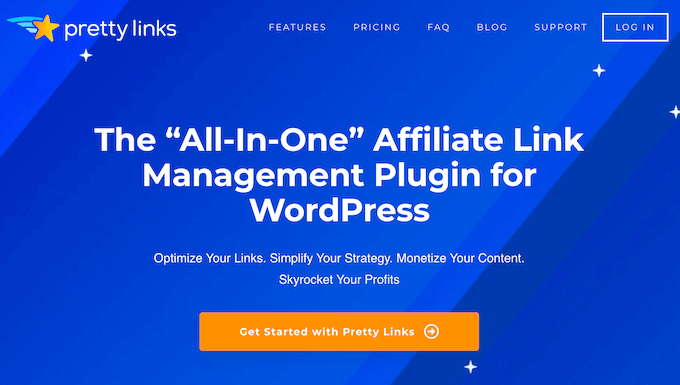
Affiliate marketing is the second most commonly used monetization strategy among bloggers. Basically, you recommend your favorite products/services to your readers, and when they make a purchase, you get a referral commission.
The key in affiliate marketing is to recommend high-quality products and services that you already use and trust.
There are plenty of affiliate marketing plugins and tools for WordPress that can help you make more money when promoting affiliate products. We recommend using PrettyLinks or ThirstyAffiliates as a must-have.
We also have a complete step-by-step affiliate marketing guide for beginners, that will help you get started with choosing the right affiliate program and strategies to monetize your blog today.
3. Online Store

Many bloggers make money by selling things directly from their blogs. This could be physical products or digital downloads like ebooks, artwork, music, and more. Some bloggers even offer consulting services.
If you’re looking to sell digital products like eBooks, then we recommend using Easy Digital Downloads because this is the plugin that we use ourselves. It has all the features you need to sell digital downloads.
If you’re looking to sell physical products, then we recommend using WooCommerce because it is the best eCommerce plugin for WordPress. It is also the most commonly used eCommerce platform in the world.
For detailed instructions, see our guide on how to easily create an online store using WordPress.
Some bloggers don’t want the hassle of creating a store to sell their own products, so they create an Amazon affiliate store, which lets them sell other people’s products from Amazon and earn a commission.
On top of the three methods above, you can do so much more with your WordPress blog. You can make WordPress blogs specifically for reviews, fashion blogging, food blogging with recipes, and more. Each of these blog types brings you more unique opportunities to make money.
You can also turn your blog into a membership site to offer premium content and courses. We have a detailed guide on how to create and sell online courses with WordPress.
Step 7. Mastering WordPress
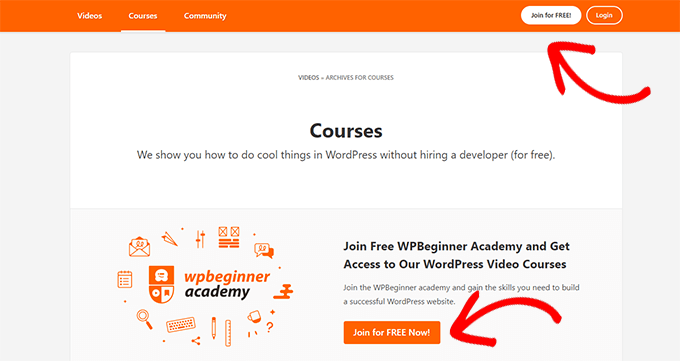
WPBeginner is the largest free WordPress resource site for beginners.
At WPBeginner, our main goal is to provide cutting-edge, helpful WordPress tutorials that are easy to understand for small businesses, bloggers, and non-techy WordPress website owners (see more about us).
To expand your WordPress knowledge, you should check out:
- WPBeginner Dictionary – The best place for beginners to start and familiarize themselves with the WordPress lingo
- WPBeginner Videos – New to WordPress? WPBeginner Videos offers free WordPress courses for beginners.
- WPBeginner Blog – The central place for all our WordPress tutorials.
For more discussions, you may want to join our free Facebook group WPBeginner Engage. With more than 97,000 members, the group is focused on helping beginners and non-tech users do more with WordPress.
You can also subscribe to WPBeginner’s YouTube Channel, where we regularly share video tutorials to help you learn WordPress.
Lastly, you can use Google to type your question and add WPBeginner in front of it. Our users find this trick to be always helpful because it makes it easy for you to find the RIGHT answer for your WordPress questions.
In case you don’t find an answer to your question, don’t worry. Simply use our contact form to send us a message. Our always helpful, full-time WPBeginner support team will be happy to assist. We love helping users get started with WordPress.
Frequently Asked Questions (FAQs)
Having helped thousands of people start a blog, we have answered quite a lot of questions. Below are the answers to the most frequently asked questions about creating a blog.
Can I create a blog without WordPress?
Yes, there are several other blogging platforms available. We have compared them all, and WordPress is by far the best website builder solution in the market for making a blog with complete ownership and freedom.
Can I build a blog without hosting?
No, that’s not possible. Web hosting is where your website files are stored. All websites need web hosting. To start a blog, you will need your own domain and web hosting.
Is it free to start a blog on WordPress?
WordPress itself is available for free. However, you’ll need to pay for hosting and domain name. Alternatively, you can start with a free blog on WordPress.com, keeping in mind the limitations of WordPress.com and how it differs from WordPress.org.
How do I come up with a good blog name for my site?
Most personal blog names are named after their creator. Other blogs are named after the topic or industry they are in. We have an AI powered business name generator that you can use to come up with blog name ideas.
What is the best blogging niche?
Choosing the right niche for your blog makes it easier to create engaging content and make more money online. Our experts have researched the 7 best blogging niches that you should consider when starting your blog.
We also created a list of the 18 most popular types of blogs to help you get inspiration.
How much does it cost to start a blog?
The cost depends on the add-ons that you buy. We have a complete guide on how much does a WordPress website cost as well as tips on how to save money.
Most blogging tools are either free or come with a 30-day money-back guarantee, so you can try them risk-free.
Can I create a blog without my parents knowing about it?
Yes. You can make your WordPress blog private and hide it from the internet. Here is a step-by-step guide on how to make your WordPress blog completely private.
Can I start a WordPress blog and make money with Google Adsense?
Yes, you can use your WordPress blog to earn money from Google AdSense. We have a step-by-step guide on how to add Google AdSense to WordPress.
How can I create a blog and remain anonymous?
If you want to have a public-facing blog but want to remain anonymous, then you need to make sure that your domain has WHOIS privacy turned on. Often, people use a pseudonym/nickname to write under. You should also create a unique email just for your blog. It goes without saying, don’t post your pictures or anything on the blog. For more detailed instructions, see our article on how to blog anonymously using WordPress.
How do I add a podcast to my WordPress blog?
WordPress makes it super easy to start a blog and add a podcast to it. We have a step-by-step guide on how to start a podcast with WordPress.
Can I build a blog in my own language?
Yes, you can use WordPress in other languages. You can select your language during installation or from the Settings page in the WordPress admin area. WordPress is fully translated into more than 56 languages and partially translated into dozens of other languages. Many top WordPress themes and plugins are also available in multiple languages. You can also translate a theme or a plugin that you want to use on your website.
How do I create a blog in multiple languages?
Want to start a blog in Hindi, Spanish, or multiple languages? Here’s a step-by-step guide on how to create a multilingual website in WordPress.
Can I design a blog with no coding skills?
Absolutely. You don’t need any programming, coding, or design skills to create a professional-looking WordPress blog.
WordPress themes are easy to customize, and you can just point and click to set up your theme. There are WordPress themes like Astra, which comes with ready-made starter websites that you can import with one click.
There are other powerful themes like Divi, which give you complete drag & drop design options for customizing your blog.
Then there are powerful drag and drop page builders like SeedProd and Divi builder that work with any WordPress theme. You can use it to just drag and drop items and design your own pages.
You can even create your own custom theme without writing any code.
Can I add a photography gallery to my blog?
Yes, WordPress comes with a built-in gallery feature that makes it easy for you to add photo galleries to your blog posts.
Professional photographers can also use premium WordPress gallery plugins to better showcase their photos and even sell photos to make money from their photography business.
How can I create a professional email address for my blog?
If you’re serious about your blog, then we highly recommend that you create a professional business email address (it’s free).
All successful bloggers use professional email addresses to stand out and make better partnership deals to grow their blogs.
Can I switch blogging platforms later?
When creating a blog for the first time, often beginners make the mistake of choosing the wrong platform like Medium, Tumblr, Blogger, or others.
The good news is that, yes, you can easily switch to WordPress. We have detailed tutorials on how to switch from:
Where do I find photos for my blog?
All great blogs use high-quality photos in their blog posts and social media. We have created a beginner’s guide on how to find royalty-free stock photos for your blog, videos, and social media.
We hope that you found our tutorial on how to start a WordPress blog to be helpful. You may also want to check out our article on 27 actionable tips to drive traffic to your new WordPress site, and our checklist on 18 important things to do after installing WordPress.
If you liked this article, then please subscribe to our YouTube Channel for WordPress video tutorials. You can also find us on Twitter and Facebook.

Syed Balkhi says
Hey WPBeginner readers,
Did you know you can win exciting prizes by commenting on WPBeginner?
Every month, our top blog commenters will win HUGE rewards, including premium WordPress plugin licenses and cash prizes.
You can get more details about the contest from here.
Start sharing your thoughts below to stand a chance to win!
Jaime says
seriously. BEST tutorial for getting started setting up a blogging site – and quickly! Thank you so much!
WPBeginner Support says
You’re welcome, glad you’ve found our guide helpful
Admin
coco o says
I honestly can’t thank you enough! so grateful for this post and your existence!!!
WPBeginner Support says
Glad our guide could be helpful
Admin
Auwalu D Adam says
thank you for this wonderful tutorial
WPBeginner Support says
You’re welcome
Admin
Ana De Langhe says
Can i get started with Bluehost as a WP beginner and then transfer my content to WordPress.org?
WPBeginner Support says
If you create your site on BlueHost then it would be a WordPress.org site
Admin
Alamin says
Thank you so much❤
WPBeginner Support says
You’re welcome
Admin
Job says
Thanks for this info. I’m trying to create a blog purposely for affiliate marketing. I tried about a year ago on Goddady but I could not set up a WordPress given my limited knowledge on design. Is it possible that I follow these steps and set up a blog or I need someone with technical knowledge? Thanks again for this article!
WPBeginner Support says
You should be able to follow these steps to create a blog
Admin
Afeni says
For years i was put off from using WordPress, now with this very simple video i’m sold. Thank you, not often i’ll sit through a 30 mins of anything on Youtube!
WPBeginner Support says
You’re welcome, glad our video and guide could be helpful
Admin
Sharique says
The tutorial video which expalins the whole procedure of hosting and running a blog, whether or not is a wordpress.org or wordpress.com?
WPBeginner Support says
Unless specifically stated, our articles are for WordPress.org and not WordPress.com
Admin
Muhammad Wahed says
Lot of stuff about WordPress
thanks a lot
WPBeginner Support says
You’re welcome
Admin
mouza says
thank you for the amazing information… it’s really helping me put my mind at ease while doing the research for starting my own blog.
looking forward to more advice from you and your team.
WPBeginner Support says
You’re welcome, glad you’ve found our content helpful
Admin
Bharat says
Really great. A real blog is something that doesn’t let the reader to go to another blog and get the knowledge. This article is the only one which gives me all the info about wordpress. Thanks wpbeginner website for giving such a deep analysis on wordpress not only for this blog but for the other topics you’ve covered
WPBeginner Support says
Glad you’ve found our content helpful
Admin
Suprem says
A very nice and detailed article, easy to understand
WPBeginner Support says
Thank you, glad you liked our article
Admin
John says
Your post is amazing
WPBeginner Support says
Thank you
Admin
Dani says
This is a great post
WPBeginner Support says
Thank you
Admin
Devaraj says
I have created WordPress site in localhost.How can I use that in bluehost?
WPBeginner Support says
You can transfer your site to BlueHost using the method in our article here: https://www.wpbeginner.com/wp-tutorials/how-to-move-wordpress-from-local-server-to-live-site/
Admin
Matt Hedlin says
I’m attempting to find the Dashboard, and from there can follow the above instructions. Where is Dashboard in a WordPress.com website? I tried appending /wp-admin but the screen is blank. Appreciate your advice.
WPBeginner Support says
There are some differences between WordPress.com and WordPress.org so not all of our tutorials will work for WordPress.com sites:
https://www.wpbeginner.com/beginners-guide/self-hosted-wordpress-org-vs-free-wordpress-com-infograph/
you would add /wp-admin to your domain when viewing url directly not when you’re in WordPress.com’s interface.
Admin
Arvin Mendoza says
So when you install the WordPress thru Bluehost, it is the .ORG and not the .COM wordpress? Am i right?
WPBeginner Support says
Correct, the site would be a WordPress.org site.
Admin
Henry says
Great detailed post!
What is your opinion of SiteGround vs Bluehost… which one is most capable of handling large websites? Which is best for small sites just starting out?
WPBeginner Support says
For our comparisons, you would want to take a look at our article here: https://www.wpbeginner.com/wordpress-hosting/
Admin
Billal Hosen Rubel says
Thanks a lot for this informative post.
WPBeginner Support says
You’re welcome
Admin
Billal Hosen Rubel says
Thanks a lot for posting this informative post. I always read your post on WordPress. All of the posts that were published on your website are very informative. I always follow your website. After all, you can say that I am a student of yours.
WPBeginner Support says
You’re welcome and thank you for reading our articles
Admin
Colleen says
Hello, i have enjoyed your newsletter and website for several years. I recently installed a new theme on a Godaddy staging platform but, instead of the staged site having the format of the theme, it took on the layout of my current site. I want the layout of the new theme. i got into the admin and tried to recreate it but ran into roadblocks. I don’t know where to get help with this. can you give me any suggestions?
Thanks, again, for your good help.
Colleen
WPBeginner Support says
If your staging site isn’t updating to the design you’re trying to change it to, you would want to reach out to your hosting provider’s support for them to take a look.
Admin
Tim Young says
I have subscribed to bluehost and installed wordpress and written a post.
This guide says that I should press ‘publish’, but then goes through all of the other things that I am worried about such as plugins etc etc. I don’t want to publish until I have got everything else right. Please advise. Thank you.
WPBeginner Support says
You’re not required to publish your post until you want it live
Admin
Ivy says
Hi,
i have a wordpress website with my own domain however its suspended? would i be able to transfer my content from my old website to the bluehosting even tho my old website is suspended? also would i be able to transfer to free hosting instead? thank you
WPBeginner Support says
You would need to reach out to your current hosting’s support for getting access to your content. Once you gain access you can transfer to a different host.
Admin
Jean Baker says
I started a free blog in WordPress and it’s a disaster. If I sign up with Bluehost can I move my current blogs over to the new site or must i remove the current wordpressxxxxx.com site first?
WPBeginner Support says
You can move your content over following our guide here: https://www.wpbeginner.com/wp-tutorials/how-to-properly-move-your-blog-from-wordpress-com-to-wordpress-org/
Admin
tango says
Hi, I find your site interesting. Few hours back I tried to subscribe through my email but instead of it saying Subscribed I still did not receive any mail stating the same. I am doing this again now but not sure if the subscribe button on your site is actually working. If possible kindly get me subscribed.
Thanks
WPBeginner Support says
Thank you for letting us know, you may want to ensure that our email is not in your spam folder as another place to check
Admin
Vera okoro says
Can we pay the blog hosting money monthly instead of yearly for new beginners ?
WPBeginner Support says
It would depend on the hosting provider you’re using for if they have that as an option
Admin
Sunil Ilanthila says
I have start my blogging career with reading articles of wpbeginner. This blog really a good asset to new or experienced once
WPBeginner Support says
Thank you, glad our tutorials could help you get started and continue to help
Admin
Rebecca says
I have a feeling I am going to rely on the post frequently at first.
WPBeginner Support says
We hope to be a helpful resource for your return visits
Admin
P.Sai Phanindra says
Thank you very much.Hope you help us if we are stuck anywhere.
WPBeginner Support says
You’re welcome, glad our content can be helpful
Admin
Ross Lysinger says
Thanks very much for this info!
Question on wordpress.org blog that I can’t figure out:
How do I repost other peoples blogs and have them display on mine.
When I try – all I get is a link displayed.
WPBeginner Support says
For what it sounds like, you would want to take a look at setting up an RSS Aggregator: https://www.wpbeginner.com/plugins/how-to-fetch-feeds-in-wordpress-using-wp-rss-aggregator/
Admin
ahmed chikh says
Hi there,
I m really interested in your WordPress blog setup offer, however your re not allowing a lot of information about, like what are exctly allowing, how are working with client, what is in the pack and what is not etc …
? !!!
WPBeginner Support says
Depending on what you’re wanting to know about, you would want to reach out using our contact form here: https://www.wpbeginner.com/contact
Admin
Ravi says
Man thank you this article is really helpful. I have a question though how much time exactly does it take to start getting a proper income out of your blog? and how long have you been on this blog? Some of the bloggers that i know say that it is VERY VERY HARD now a days to get your blog running because there is a lot of competition in the market, is it true if so do you think a newbie can start it? thanks again. <3
WPBeginner Support says
Sadly, there are too many variables for a timeline on specifically when you would make a certain amount of income. For how long we have been around, it was 10 years this July 4th: https://www.wpbeginner.com/news/wpbeginner-turns-10-years-old/
Admin
Burgess says
On WordPress.org, you said domain name and bluehost is free. How long does it last? Is it free continuously?
WPBeginner Support says
It is free for the first year, after which you would need to renew the domain
Admin
Kyle says
For a first time wordpresser like me, this was very, very helpful. Gratitude.
WPBeginner Support says
Glad our guide could be helpful
Admin
L.Arumugaperumal says
I read it, but I have not yet studied. This guide is usefully for me. So I have bookmarked this page.
WPBeginner Support says
We hope our article can be helpful when you come back to it
Admin
Sheshadriraju says
What will be cost after 36 month package?
WPBeginner Support says
For specifics on the pricing, you would want to check with the hosting provider you are using
Admin
Ghulam Murtaza says
Very nice information about how to start blogging.
WPBeginner Support says
Thank you
Admin
JANE BRYSON says
I have been so worried that I wouldn’t be able to go from installation to publish. After watching your video, I am confident that I can do it! Thanks so much, WPbeginner.
WPBeginner Support says
You’re welcome, glad our video could be helpful
Admin
Festus says
When registering via bluehost, how do you choose between WordPress.com and WordPress.org
WPBeginner Support says
If you register on BlueHost then your site would be a WordPress.org site
Admin
Sachin Pal says
this is best way to learn about word press an start your blog .i m bignr too and i m start blogging now
WPBeginner Support says
Thank you, glad our guide can help you get started
Admin
terry boza says
waaaw ! Excellent. one problem for me though , i’m a bit confused , are these steps for wordpress.org or wordpress.com ?
completely newbie ! Excuse my limited intelligent ; )
WPBeginner Support says
Our tutorials are for WordPress.org sites
Admin
Vana Verouti says
At wpbeginner I always find the answer to my question. I follow your website since the very first moment I decided to start my blog
Thank you very much, your help is precious!
Love
Vana
WPBeginner Support says
Thank you, glad our guides could help you
Admin
Miyat Cortez says
I have little knowledge about blogging and I’m planning on creating one but I can’t think of any content yet. This guide will be helpful for me.Thank you
WPBeginner Support says
Glad our content can be helpful
Admin
Faizan raza says
How to start affiliated program from Pakistan tell me plz.
WPBeginner Support says
If you’re wanting to start an affiliate program you would want to take a look at our guide here: https://www.wpbeginner.com/plugins/how-to-create-a-referral-program-in-wordpress/
Admin
Rashmi says
Hi, firstly thank you for the great material. Can I start a blog following the same steps but with the different web hosting?
WPBeginner Support says
The steps to install WordPress may be different but the rest of the process should be the same
Admin
Vishnu Dudipalla says
OMG’ Undoubtedly its a big big resource to WP beginners thanks @wpbeginners for making it so simple with ur detailed instructions & guides.
WPBeginner Support says
Thank you, glad you’ve found our content helpful
Admin
Tammy C. says
Hi! Thank you so much for taking the time to list this resource! I’m new to blogging and owning my own site in general. Do you recommend owning 2 domain names? Ie. youdomain.com AND yourdomain.com
I heard there are situations people buy domains similar to the actual one and ransom it.
WPBeginner Support says
For most sites that shouldn’t be an issue that you should worry about, you should only worry about your primary domain and not ones similar to it.
Admin
Ayesha says
Thank you so much. It’s helpful. I want to start a blog and a dropshipping store.
I am just a beginner.
Should I start both at the same time?
WPBeginner Support says
You certainly can if you’d like
Admin
Ayesha says
Alright.
I will.
Carin says
Great insight, thank you.
WPBeginner Support says
You’re welcome
Admin
Issa Dody says
Appriciate. but in this new vision how to set classic post are?
WPBeginner Support says
If you mean you want to revert to the classic editor you would want to take a look at our article here: https://www.wpbeginner.com/plugins/how-to-disable-gutenberg-and-keep-the-classic-editor-in-wordpress/
Admin